#irene vallejo
Text
Cuando una relación se rompe, muere un dialecto. Enamorarse reaviva la alegría infantil de inventar palabras, un Génesis verbal. Forjamos frases que evocan un recuerdo compartido, sobreentendidos, expresiones corrientes con sentidos ocultos. Ideamos apodos, inflexiones nuevas —nuestras—, claves imposibles de entender fuera del círculo mágico. Nos excita ser comprendidos solo por los más íntimos. Y cuando al amar vamos explorando un cuerpo aún desconocido, creamos, dando nombre a sus rincones, una cartografía física cuyos topónimos nadie más pronunciará.
Irene Vallejo, «Columna» en EL PAÍS.
#editions#frases#notas#citas#irene vallejo#columna#el pais#diario#periodico#boletin#textos#español#writings#pop#arte#soledad#desamor#amor#romance#reflexiones#pensamientos#sentimientos#vida#relaciones#pareja#filosofia#quotes#literatura#post#melancolia
738 notes
·
View notes
Text
{Mass media and social networks} urge us to admire all the innovations rushing toward us like surfers on the crest of a powerful wave. But historians and anthropologists remind us that in the water's depths, changes are gradual. Víctor Lapuente Giné has written that modern society suffers from a clearly future-oriented bias. When we compare something old and something new — like a book and an iPad or a nun sitting next to a texting teenager on a train — we believe that the new thing has more of a future, when in fact the reverse is true. The longer an object or custom has been with us, the greater its staying power. On average, the newest things die out first. It's more likely that nuns and books will exist in the twenty-second century than WhatsApp and tablet computers. There will be tables and chairs in the future, but maybe not plasma screens or cell phones. We'll be celebrating the winter solstice long after we stop using tanning beds. An invention as ancient as money has a strong chance of outlasting 3D cinema, drones, and electric cars. Many trends that seem irrevocable — from rampant consumerism to social networks — will subside. And old traditions that have been with us since time immemorial — from music to spiritual exploration — will never disappear. In fact, when we visit the world's most socioeconomically advanced countries, what's surprising is their fondness for archaisms — from monarchy, protocol, and social rituals to neoclassical architecture and outdated streetcars.
— Irene Vallejo, Papyrus: The Invention of Books in the Ancient World
544 notes
·
View notes
Text

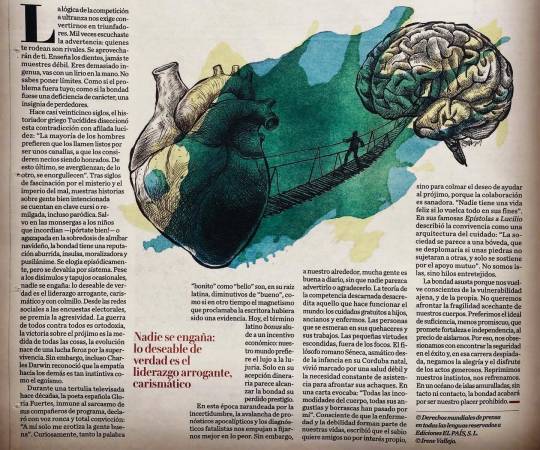
El homenaje a Gloria Fuertes de Irene Vallejo. Un artículo publicado en El País.
10 notes
·
View notes
Text
Somos los únicos animales que fabulan,que ahuyentan la oscuridad con cuentos, que gracias a los relatos aprenden a convivir con el caos, que avivan los rescoldos de las hogueras con el aire de sus palabras, que recorren largas distancias para llevar sus historias a los extraños. Y cuando compartimos los mismos relatos, dejamos de ser extraños.
#el infinito en un junco#irene vallejo#libros#citas en español#amoleer#ilovetoread#literatura#books#literature#books and libraries#bookaddict#booklover
5 notes
·
View notes
Text

"Los libros son albergues de la memoria,
espejos donde mirarnos para poder parecernos más a lo que deseamos ser.
Estos frágiles universos son nuestra fuerza".
–Irene Vallejo
#irene vallejo#frases#escritos#pensamientos#poesia#fragmentos#literatura#escritores#libros#poemas#literatura universal
4 notes
·
View notes
Text

This is a book about the history of books. A journey through the life of this fascinating artefact that we invented so that words could travel through space and time. The history of their manufacture, of all the types we have tried over almost thirty centuries: books of smoke, of stone, of clay, of reeds, of silk, of leather, of trees and, the latest arrivals, of plastic and light.
But, above all, this is a fabulous collective adventure starring thousands of people who, over time, have made books possible and protected them: oral storytellers, scribes, illuminators, translators, peddlers, teachers, sages, spies, rebels, nuns, slaves, adventurers... Readers in mountain landscapes and by the roaring sea, in the capitals where energy is concentrated, and in the most remote enclaves where knowledge takes refuge in times of chaos. Ordinary people whose names are often not recorded in history, those saviours of books who are the true protagonists of this essay.
Via Fundación Colección Thyssen-Bornemisza
#books#favorite books#history#culture#el infinito en un junco#infinity in a reed#irene vallejo#spanish writer
5 notes
·
View notes
Text
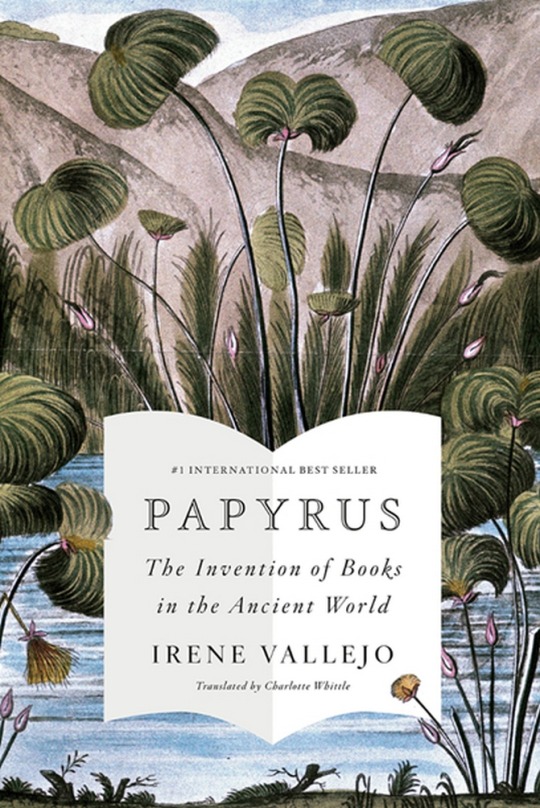
Irene Vallejo, Papyrus. The Invention of Books in the Ancient World, 2023
https://en.wikipedia.org/wiki/Irene_Vallejo
5 notes
·
View notes
Text

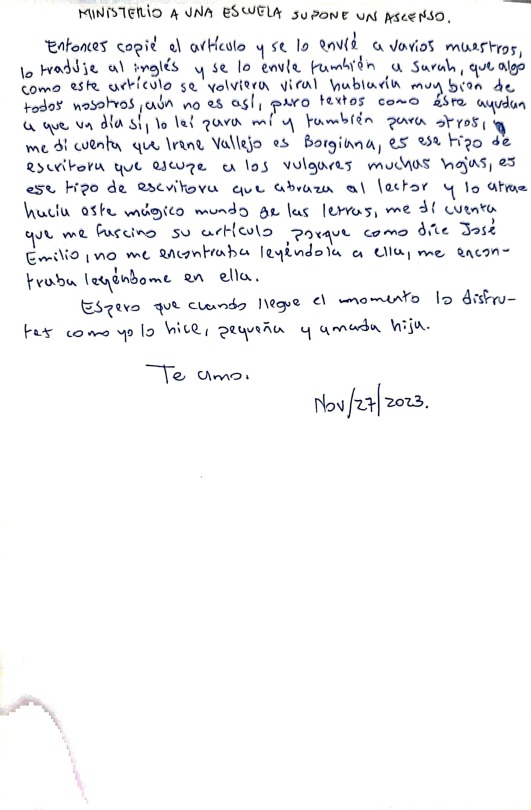
#irene vallejo#libros#cartasamihija#pensamientos#literatura#palabras#escribiendo en soledad#cosas que escribo
3 notes
·
View notes
Text
"Un día por fin tengo un lápiz entre los dedos. No se deja sujetar fácilmente, hay que domesticarlo. Lo aprieto con fuerza contra el papel para que no se escape, pero a veces se planta en rebelión, partiéndose las narices contra el cuaderno”.
Irene Vallejo (2019). El Infinito en un Junco.
#irene vallejo#el infinito en un junco#ansiotextos#frases#citas#pensamientos de una ansiosa#notas#textos#fragmentos#escritos
23 notes
·
View notes
Text
"ese lugar donde quieres ser admitido, pero, cuando te invitan, te sientes un advenedizo inseguro. No perteneces a ese mundo, por muy enamorado de él que estés. Te dejarán entrar durante un solo verano encantado, [...] caer en la red del deseo, pero las puertas volverán a cerrarse. Y ese espacio quedará unido para siempre a tu melancolía."
- Irene Vallejo, El infinito en un junco
#irene vallejo#citas de escritores#citas#cita en español#frases en español#escritos#frases#melancolía#viajar#viajes#erasmus#echar de menos#añoranza#pertenecer#verano#lugares
4 notes
·
View notes
Text
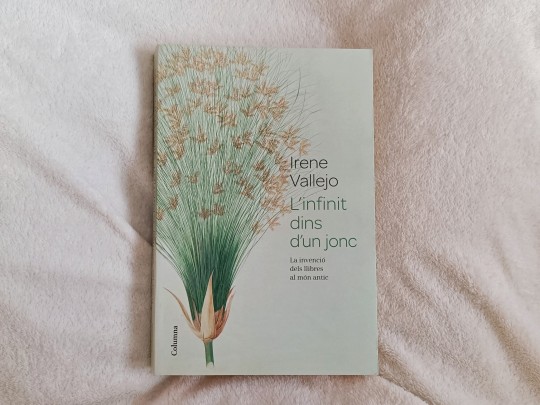
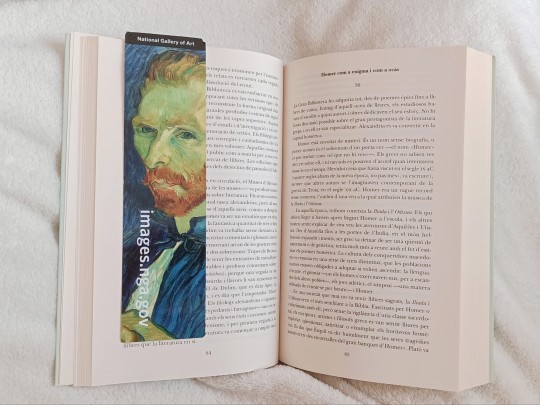
I think many of you would enjoy this book. In English, it has been published with the tile "Papyrus: The Invention of Books in the Ancient World", but I like the original title better: "Infinity Inside a Reed: The Invention of Books in the Ancient World".
As the subtitle says, it talks about the history of books, as well as libraries, by extension. But don't expect a history book full of names and years in chronological order. It's narrated in a very lively and almost poetic way, back and forth connecting topics.
It's divided in two chapters. The first half of the book corresponds to Ancient Greece (with its connections with Mesopotamia, Egypt and Persia) and the second half, to Rome (with its connections to early Christianity and the Middle Ages).
As an archaeologist, lots of the things the book talks about weren't new to me, but even then it was a very enjoyable read. I recommend it to everyone who is interested in history and books.
#mine#books#history#bookblr#irene vallejo#papyrus#papyrus the invention of books in the ancient world#papyrus: the invention of books in the ancient world#el infinito en un junco#classics#reading#book recs#book rec#library of alexandria
6 notes
·
View notes
Quote
A paixão do colecionador de livros é parecida com a do viajante.
Irene Vallejo, no livro "O infinito em um junco". tradução Ari Roitman e Paulina Wacht. Intrínseca, 2022
#irene vallejo#excertos#trechos de livros#coletânea de palavras#prosa verso e arte#templo cultural delfos
6 notes
·
View notes
Text
Heraclitus was nicknamed "the Riddler" and, later, "the Obscure." The murkiness of life and its extraordinary contradictions seem to spill into and permeate his writings. His work marks the beginning of difficult literature, where the reader must make an effort to wrest meaning from the words. Heraclitus is the father of Proust, with his labyrinthine sentences full of twists and turns; of Faulkner, with his disorienting, often disjointed monologues; and of Joyce, who gives the impression in Finnegans Wake that he is writing in several languages — some of his own invention —all at once. This isn't to say they're related due to similar styles. In fact, we have only a handful of Heraclitus's brief, enigmatic, powerful maxims. What they actually have in common is their attitude to words: if the world is cryptic, then the appropriate language to represent it should be dense, mysterious, and difficult to decipher.
Heraclitus believed reality could be explained as permanent tension. He called it "war," or a struggle between opposites. Day and night, wakefulness and sleep, life and death: all these become each other and can only exist in opposition; they are fundamentally two sides of the same coin. "It is sickness that makes health good and pleasant; hunger, plenty; hard work, rest...the immortals mortal, the mortals immortal, living the death of others and the life of others while they fade.""
— Irene Vallejo, Papyrus: The Invention of Books in the Ancient World
216 notes
·
View notes
Text
Irene Vallejo no es una escritora. Es una exploradora. Y cada vez que vuelve de sus viajes nos trae alguna cosa como esta:
Naomi Shihab Nye, poeta nacida de padre palestino y madre estadounidense, recitada por Emma Thomson.
Bondad:
"No sabrás lo que es la bondad si no has perdido nada antes,
si no has sentido el futuro disolverse, como sal en un caldo frágil.
Lo que tenías en tu mano, lo que contaste y guardabas con recelo,
todo eso debe irse para que sepas lo desolado que puede ser el paisaje entre las regiones de la bondad.... "
2 notes
·
View notes
Text
Necesitamos conocer culturas alejadas y diferentes, porque en ellas contemplaremos reflejada la nuestra. Porque solo entenderemos nuestra identidad si la contrastamos con otras identidades. Es el otro quien me cuenta mi historia, el que me dice quién soy yo.
#el infinito en un junco#irene vallejo#libros#citas en español#amoleer#ilovetoread#literatura#books#literature#books and libraries#bookaddict#booklover
6 notes
·
View notes
Text

De uma forma misteriosa e espontânea, o amor aos livros forjou uma corrente invisível de gente, homens e mulheres, que ao longo das eras, sem se conhecer, salvou o tesouro de relatos, sonhos, pensamentos...
Irene Vallejo, Infinito em um Junco
2 notes
·
View notes